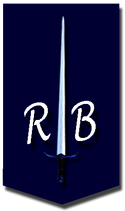| This page documents an official policy on the English RB site. It has wide acceptance among editors and is considered a standard that all users should follow. Admins, Please do not edit this page without first ensuring that your revision reflects consensus. When in doubt, discuss it first on the talk page. |
This is the User Guides policy. It describes what a guide consists of as well as clarifies which user guides are are editable by anyone and which should probably be left to the original author.
User Guides are welcome additions to the Retributions Blade database, but frequently users mistake this acceptance for an agreement that they can freely credit themselves, other players, or their friends for the ideas proposed in them. This is not the case and clearly violates the Credits Policy.
User Guides are just like any other article on the website: they can be and should be edited by anyone. Placing an article in the main namespace implies that you agree with this policy. If you wish to be sure you are credited for your ideas in a user guide that exists in the main article namespace, register for a user account, be sure to log in, and make your changes to the article without signing your name to them. The articles History tab shows which users have made changes and allow any user of the database to clearly see who's had a hand in making the article great.
User Guides should consist of factual information data consistent with current game mechanics. When an article contains outdated information it can and should be updated by anyone. Authors should strive to include information that applies to every situation unless it is clearly specified otherwise. In those cases where information may be specific to a particular class, scenario, or event, care should be taken to outline the specifics in detail so as not to confuse the reader.
Naming User Guides
User guides placed in the general article mainspace can be named for their class and the kind of guide they are. For example, a Monk tanking guide could be called "A Monk's Guide to Tanking." In no case should these general articles be named for any person, character or user. In this example all information should apply to the Main Subject "Monk Tanking" and not stray off topic especially into more general information unless it's required to explain a particular detail.
If a guide is created with a person's name attached or contains user opinions and the person creating it has a logged in user ID, Admins will move that guide to the person's User namespace. If the guide is created by someone who hasn't logged in and the guide only shows an IP address as the creator, that guide will be moved to a name more appropriate for the general article namespace.
Maintaining Partial Editorial Control of User Guides
If you find that you have ideas that really can't be edited by anyone else, contain opinions or controversial issues consider not adding them to the database. But if you still feel obligated to share the information, there's one way to limit BUT NOT PREVENT other people from editing your work. Place articles you wish to keep under firmer editorial control in your own User space.
For example, if Deaura wanted to create a specific and personal user guide on the different ways of tanking for Monks that she could work on primarily on her own, she could create an article in her user namespace using the following code:
[[User:Deaura/Deaura's Monk Tanking Guide]]
This wouldn't guarantee that no one else would edit the article, but it would, in essence, clearly state to people that the article was her own personal opinion or something she was working on.
In that same vein, when a person's work is listed in their personal User space, it is considered good form to comment on that article's talk page first before making edits to it. Quite frequently that person considers the guide or article a work in progress and significant edits to the article would disrupt the flow of their writing process. While edits to these pages are considered acceptable even though they exist in someone's User namespace, use the talk page first or add comments in the comment field section. "Admin Guide Tags" are required on all User Guides to facilitate access to the Guild Policy and Terms of Use. To insert the tag, add the code:
{{Admin Guide Notice}}
at the beginning of your guide.
See Also
- Ownership of Wikipedia articles, on which this page was based.
- AuthorshipModel - a discussion of authorship of wiki pages.
